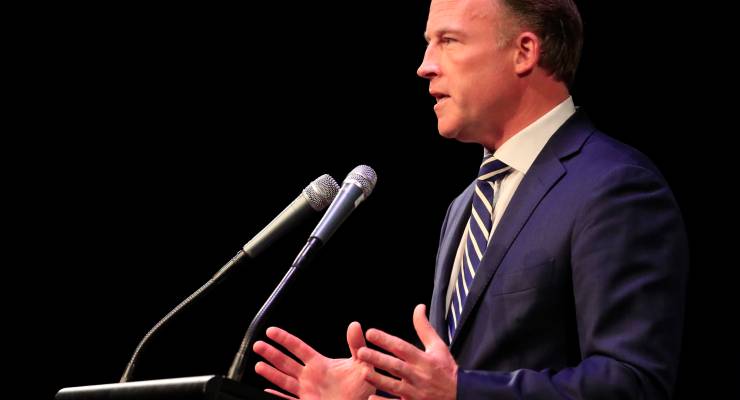
Tasmanian Premier Will Hodgman
After a grim start to the year for the Coalition at federal level, the Tasmanian state election provided some rare good news to warm conservative cockles on Saturday.
The re-election of Will Hodgman’s government was a remarkable feat by any standards, particularly those of a state that has traditionally given the Liberals slim pickings.
This was only the second time in the state’s history that the Liberals had achieved successive parliamentary majorities, the first being in the 1980s.
With a shade over 50% of the statewide vote, the Liberals have won at least 13 of the 25 seats in the state’s lower house, and will perhaps make it to 14 — only one short of their unprecedented haul when Hodgman swept to power in 2014.
If the election had been held under a conventional electoral system rather than Hare-Clark, the Liberals would have won about 56% of the two-party vote and all but a handful of the seats.
As always, wildly divergent narratives have emerged to explain such an extraordinary result.
The Liberals are duly pleased with themselves for having run a campaign based on bread-and-butter economic fundamentals, aided by the economy’s undeniably strong performance on Hodgman’s watch.
Hopefully they do not also imagine themselves to have been vindicated in their all-but-secret policy to relax the state’s gun laws, news of which probably broke too late to have much impact — partly thanks to the state’s archaic law prohibiting news coverage of the election on polling day.
Opposition Leader Rebecca White capped her disappointing evening with a concession speech that conceded very little, except that her party had been prohibitively outspent.
Liberals dismiss talk of a 10-to-one imbalance between their own campaign spending and Labor’s as exaggerated, but most observers on the ground find it all too easy to believe.
Given the state’s lack of donation disclosure laws, and the laxity of the regime that persists at federal level, we will have to wait until next year before we have even a vague idea of how this was achieved.
However, it can hardly be doubted that the active ingredient was a massive infusion of funding from interests that stood to lose out from Labor and the Greens’ policy to phase poker machines out of pubs and clubs by 2023.
The crucial question is whether the Liberals owed their success to the intrinsic qualities of their message, or to the blanket coverage they were able to secure for it through every imaginable medium since the start of the year.
Conventional wisdom is likely to favour the latter view, exacerbating the reluctance of the major parties to tread on the toes of powerful interests.
Labor can at least console themselves with having gained two or (more likely) three seats, along with an extra 5% share of the vote — albeit that this comes off the miserable base of their landslide defeat in 2014.
The clearest loser was the Greens, who have now progressed from 21.6% of the vote in 2010 to 13.8% in 2014 to barely 10% in 2018, and from five seats to three to potentially as few as one.
Tough questions will be asked as to where it has all gone wrong, but the answers may lie in factors beyond the party’s control.
The Greens’ relative strength in the noughties owed less to the superior qualities of their leadership at the time than to an entrenched Labor government that was proverbial in its enthusiasm for the state’s logging interests.
Just as green parties in the United Kingdom and New Zealand shed support last year when faced by Jeremy Corbyn and Jacinda Ardern, so have the Tasmanian Greens been marginalised by a new-look ALP led by a popular figure from the party’s left, who has matched their tough line on poker machines.
For Labor’s part, gains made at the expense of the Greens are of limited comfort for as long as the Liberals can harness the support of half the electorate, through fair means or foul.
Rebecca White insists Labor will stay the course on poker machines reform, but it will take rare political courage for her to remain firm in that position all the way through to the next election.








People who are not addicted to gambling should show some pity for those who are (and more so for their unfortunate families), and boycott venues that survive on poker machines.
Clearly a political solution will be a long time coming, and the owners and makers of those evil machines are never likely to develop a conscience.
I heard that the Libs will water down the gun laws. If true, this will be an interesting space to watch – given the freaken elephant in the Tassie room.
All that money thrown at the election, so many deals kept secret from the general public, & the Libs still suffered a swing against them. I don’t think they can pat themselves on the back too hard.
“Just as green parties in the United Kingdom and New Zealand shed support last year when faced by Jeremy Corbyn and Jacinda Ardern”
Indeed Mr Bowe, I suspect that people are actually looking for an opposition party, and too often find that Labor isn’t in the list. Mr Shorten, if he really wanted to damage the greens, might like to consider policies that work for the common good.
How can you say that this is a victory for the Liberals, when they’ve sold their independence to the pokies lobby? They may as well badge themselves as the political arm of Federal Hotels.